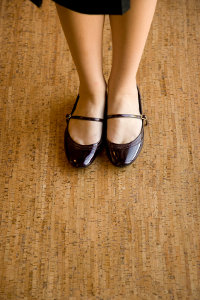
The unusual patterns and rich colors in cork flooring provide a unique look that can match existing wood furniture or trim in any room. The unique elasticity of cork flooring -- it contains air pockets that bounce back after compression and feels especially good on the foot -- makes it ideal for kitchens where standing for long periods is common.
Cork flooring is made from the bark of cork oak trees: the scraps of cork left over from the making of wine bottle stoppers are used to ensure that all the cork harvested is utilized. Manufacturers take the leftover bark, grind it up, mix in some adhesive, and then press the material into sheets that are later cut into tiles or glued to other materials to make plank flooring.
Those unfamiliar with cork floorings may think it too soft, but in fact, it is highly durable and water resistant. Flooring comes in both tiles and planks, and can have glue or no glue installation system. The cost of cork flooring ranges between about $4 to $10 a square foot with variations depending on the quality as well as the treatment received in the manufacturing process.
Consumers can choose cork flooring in tiles or laminate planks. Tiles are typically about 3/16 of an inch thick and 12 inches square; they are installed by being glued directly to a plywood subfloor or to concrete. Laminate cork flooring consists of multiple layers of material with compressed cork at the top, particleboard in the middle, and a bottom layer of uncompressed cork.
A variety of colors in cork flooring is available in addition to the shades of untreated cork. Manufacturers attain the various colors by heating the naturally-occurring sugar grains in the cork -- in effect caramelizing the sugar -- to turn beige or brown.
Warranties against manufacturing defects vary depending on the manufacturer but many offer 15 years limited coverage. Often the warranty applies only to the purchaser of the material and not subsequent homeowners. Consumers should check with the manufacturer of the flooring they wish to purchase. Floor installers may offer separate warranties covering their labor.
Homeowners enjoy a number of advantages from their cork flooring including insulation from sound as well as protection from heat or cold. The air pockets present in the cork keep floors at an even temperature which contributes to a home's overall energy management efforts. Cork's cushioning effect makes it particularly comfortable to stand on and will absorb the shock of dropped objects and prevent them from breaking when they land on the floor.
One of the most common problems with cork flooring is that sharp or heavy objects may damage the surface. Furniture and appliances may permanently dent the tiles and should be set onto furniture pads to protect the floor.
The color of cork floors -- as with any other flooring material -- may fade in direct sunlight and the movement of area rugs or carpets may reveal a different color from the rest of the floor. Shades or heavy curtains installed in a room with cork flooring can prevent fading and discoloration due to ultraviolet rays. Age may also affect color as will the use of inappropriate cleaning products. Grit and sand may scratch the surface and should be swept away to avoid this problem.